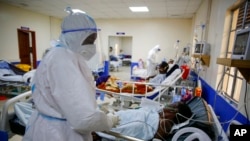Friday’s commemorations coincided with the 75th anniversary of the World Health Organization (WHO), which was created in the aftermath of World War II, with the mandate of paving way to a healthier, more peaceful, and secure world.
WHO reports that the world has made strides towards their vision, such as increased life expectancy from 46 to 73 years, the eradication of smallpox and polio being on the cusp of elimination.
Despite the reported progress, WHO’s Director-General Tedros Adhanom Ghebreyesus argued that the COVID-19 pandemic profusely impacted global health.
Tedros referred to COVID-19 as the most severe health crisis experienced this century.
"And as COVID-19 has exposed so brutally, there remain serious gaps in the world’s defenses against epidemic and pandemics," Tedros said, adding, "for all these reasons and more, the world needs WHO now more than ever."
WHO warned of health emergencies and challenges in coming years, a development resulting from the emergence of new diseases and deadly pathogens like Ebola, Marburg, SARS, and COVID-19.
Last month, WHO’s member states started discussions about a global accord to prevent and better prepare for future health emergencies, which Bruce Aylward, the special advisor to the director-general stressed its importance.
"The world is at increasing risk of new pandemics emerging and I think the world, everyone would be remiss not to just concentrate minds, efforts, political capital where needed," Aylward said.
"We want to make sure that we are much, much better prepared than we were for this and we can be with the accord under negotiation," he added.
Health officials are hopeful that the pandemic accord will be completed and ready for adoption at the World Health Assembly in 2024, a position echoed by WHO’s director-general, who stressed that no nation could protect itself from future epidemics without international cooperation.






